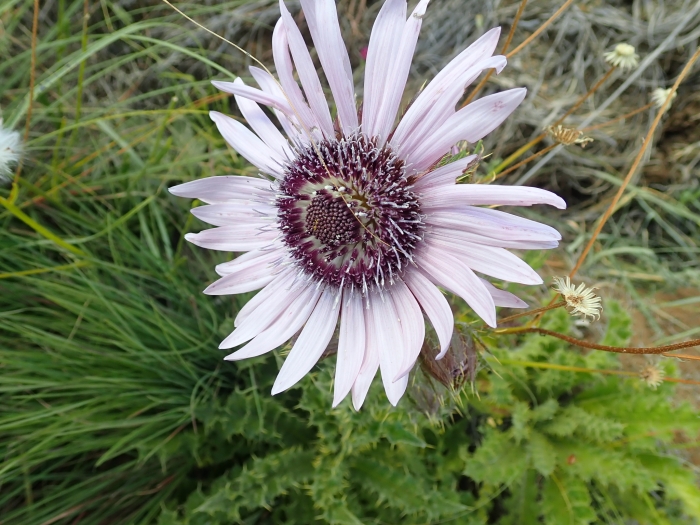Purple Berkheya
(Berkheya purpurea)
Purple Berkheya (Berkheya purpurea)
/
/

Peter Warren
Public Domain
Image By:
Peter Warren
Recorded By:
Copyright:
Public Domain
Copyright Notice:
Photo by: Peter Warren | License Type: Public Domain | License URL: http://creativecommons.org/publicdomain/zero/1.0/ | Rights Holder: Peter Warren | Publisher: iNaturalist | Date Created: 2021-03-14T11:29:24-07:00 |










































Estimated Native Range
Summary
Berkheya purpurea, commonly known as Purple Berkheya, is a deciduous perennial herb native to the grasslands and rocky slopes of Southern Africa, particularly in South Africa. It typically grows to a height of 2-3 feet (0.6-0.9 meters) and can spread 2-6 feet (0.6-1.8 meters) wide. The plant features spiny, thistle-like foliage and bears striking purple and white flowers during the summer months, which are highly attractive to pollinators such as bees and butterflies.
Purple Berkheya is valued for its unique appearance and drought tolerance, making it a suitable choice for xeriscaping and rock gardens. Its flowers add a splash of color to the landscape and can be used in cut flower arrangements. In cultivation, it thrives in full sun and requires well-drained soil, tolerating a range of soil types from sandy to loamy. It is relatively low maintenance, needing minimal water once established. While it is not commonly afflicted by diseases, snails and slugs may sometimes be attracted to the foliage. Purple Berkheya can be propagated by seeds or division, and it is recommended to handle the plant with care due to its spiny leaves.CC BY-SA 4.0
Purple Berkheya is valued for its unique appearance and drought tolerance, making it a suitable choice for xeriscaping and rock gardens. Its flowers add a splash of color to the landscape and can be used in cut flower arrangements. In cultivation, it thrives in full sun and requires well-drained soil, tolerating a range of soil types from sandy to loamy. It is relatively low maintenance, needing minimal water once established. While it is not commonly afflicted by diseases, snails and slugs may sometimes be attracted to the foliage. Purple Berkheya can be propagated by seeds or division, and it is recommended to handle the plant with care due to its spiny leaves.CC BY-SA 4.0
Plant Description
- Plant Type: Herb
- Height: 1.5-3 feet
- Width: 1.5-6 feet
- Growth Rate: Moderate
- Flower Color: Purple, White
- Flowering Season: Summer
- Leaf Retention: Deciduous
Growth Requirements
- Sun: Full Sun
- Water: Low
- Drainage: Medium, Fast
Common Uses
Deer Resistant, Drought Tolerant, Low Maintenance, Rock Garden, Salt Tolerant, Showy Flowers
Natural Habitat
Grasslands and rocky slopes in Southern Africa
Other Names
Common Names: King’s-Mantle, Potato Bush, Bloudisseldoring, Sehlohlo
Scientific Names: , Berkheya purpurea, Stobaea purpurea, Crocodilodes purpureum,
GBIF Accepted Name: Berkheya purpurea (DC.) Benth. & Hook.fil. ex Mast.